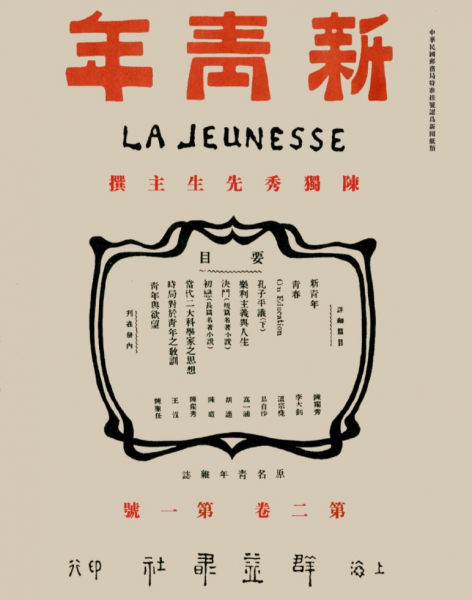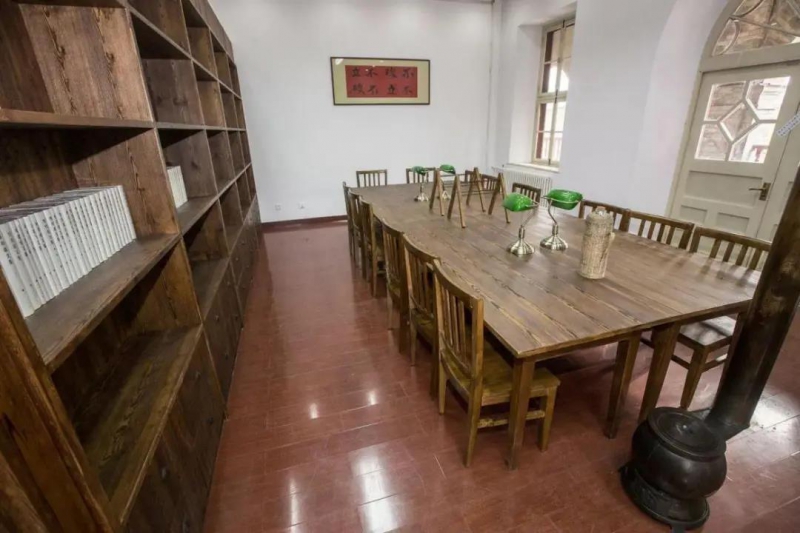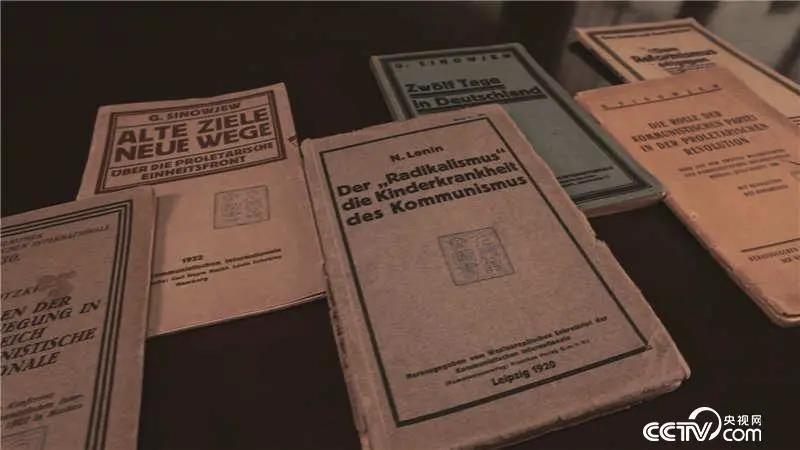PKU's Role in the Formation of the Communist Party of China
July 23, 2021, marks the 100th anniversary of the Communist Party of China (CPC). Over the past century, Peking University (PKU) has been an ever-present witness to the growth of the CPC, as well as playing an indispensable role during the party's formative years.
As the CPC continues to lead the country towards prosperity, PKU will remain a steadfast supporter of the CPC, carry forth the academic legacy of PKU that embodies crucial Marxism values, as well as driving the progress of socialism forward.
Home to the New Culture Movement and the May Fourth Movement: providing an ideological basis for Marxist-Leninism
Peking University is home to the New Culture Movement and the May Fourth Movement, and both were monumental events that shifted the cultural and ideological landscape of modern-day China and paved the way for the introduction of Marxism in China, which lead to the eventual founding of the CPC.
December of 1916 marked the start of PKU's affinity with the CPC - it was then that educator and democratic revolutionary Cai Yuanpei was appointed president of Peking University. Freedom of thought and embrace of diversity were regarded as key tenets of his educational philosophy, and he worked tirelessly towards liberal reform during his tenure.
The seeds of ideological revolution were immediately planted in the heart of PKU's tradition when Chen Duxiu, founder and editor of the Youth (renamed New Youth in 1916) magazine, arrived on campus.

New Youth magazine
The Youth magazine was a culmination of Chen's liberal propositions. In its monthly issues, works calling for a vast intellectual, literary, and cultural revolution were wielding the ideals of democracy and scientific spirit. When Chen was appointed dean of the School of Letters at Peking University, the base of New Youth was relocated. Liberal and progressive professors and students in PKU became primary writers and editors for the monthly publication. New Youth grew to become the flagship magazine of the liberal movement, and Peking University quickly became the critical player in this literary revolution.
In a period of uneasy social transition, the New Culture Movement stressed the importance of democracy and science, campaigning an end to what they perceived as the stifling and anti-democratic influence of mainstream Confucianism on Chinese society. PKU students and professors worked towards a profound liberation of thought and mind. By targeting the ideological stronghold Confucianism claimed on society, the movement unleashed powerful ideological forces that coalesced into political awakening. Key components of liberalism and society came to tackle the pressing issue of national salvation, with the height of their efforts resulting in the May Fourth Movement.
The May Fourth Movement was gathered from the spirit of the New Culture Movement. It was named after the date of the popular student protests in 1919 against the unsatisfactory Chinese diplomatic policy proposed at the Versailles Peace Conference. When news of the diplomatic setback broke loose, the student community was taken over by an upsurge of patriotic sentiment. On the 4th of May, 1919, with the initiation and organization of PKU students, over 3000 students from various universities in Beijing gathered on Tian'anmen Square for a massive demonstration, an epochal event that would go down in history. Further strikes and widespread public uproar occurred in the following June, finally pressuring the Beiyang government into refusing to sign the Treaty of Versailles.
The floodwaters of patriotism swept up the youth by masses. The students of PKU in particular became the tokens representing youth intellectualism and political activeness. At the same time, the victory of the May Fourth Movement provided an upsurge of societal and intellectual fervour. With the influx of foreign intellectual ideologies incoming en masse, Marxism-Leninism was the ideology which provided the patriotic intelligentsia with a coherent, rigorous framework for understanding prevailing national issues. Revolutionary pioneers Chen Duxiu and Li Dazhao, with Peking University as their stronghold and main base of activity, would go on to become co-founders in the formation of the CPC.
Peking University as the center of Marxist thought
Li Dazhao, director of PKU Library and a professor at PKU at the turn of the 20th century, shone a ray of light into a transitory period when China was crippled with internal and external threats. He took inspiration from the success of the Bolshevik Revolution in 1917 and became the first in China to systematically study, practice, and disseminate Marxist ideology. In November 1918, Li Dazhao delivered a speech entitled "The Victory of the Common People" in Tian'anmen Square, where he expressed tremendous appreciation for the October Revolution and introduced Bolshevism to Chinese people, elucidating a path of revolution for China.

Li Dazhao
Li Dazhao had Peking University as his base for the spread of Marxism in China. New Youth proved a crucial channel for publicity. Li Dazhao published two articles titled "The Victory of the Common People" and "The Victory of Bolshevism" in New Youth, exclaiming that "the victory of Bolshevism is a victory of the new spirit, the victory of a common consciousness that has seized the hearts of mankind in the 20th century." Following that, "My View on Marxism", a monumental essay published in 1919 in New Youth, marked the beginning of Marxism studies in China. Li Dazhao systematically introduced Marx's historical materialism, political economy, and scientific socialism, while clarifying divergent takes.
As a result, Peking University became the first university in China to offer courses related to Marxism. Li Dazhao opened courses such as Historical Materialism, History of Historical Ideology, Modern Politics, and Socialism and Social Movements, formally incorporating Marxism in his curriculum. His lectures left a decisive influence on many students at Peking University who would later become important communist personnel.
Marxist studies at Peking University also existed beyond the classroom. The Marxist Research Society of Peking University was established under the direction of Li Dazhao. With support from the PKU administration and the PKU student body, the organization developed rapidly. By 1923, the organization saw a membership of around 250. Most of its members were from PKU, with some of the leading members later joining the central CPC government. The Marxist Research Society was one of the first revolutionary groups in China to study and spread Marxism.
Under the initiative of Li Dazhao, the Socialist Research Society of Peking University was also founded in December 1920. This society aimed to gather members who had faith and drive to study socialism, as well as offering opportunities engaging in research and dissemination of socialist ideology. Its establishment was significant in promoting the study of socialism, furthering the spread of socialist thoughout China.
After the May Fourth Movement, socialism became the mainstream ideology among youth. However, the ideology also consisted of various self-conflicting strains. From 1919 to 1922, Li Dazhao, Chen Duxiu, Deng Zhongxia, and other pioneering Chinese Marxists waged a resolute fight against anti-Marxist doctrines, in particular pragmatism, Guild Socialism, and anarchism. Their endeavours helped distinguish Marxism from other theories, thereby bolstering efforts to promote Marxism. The debates also prepared the early Marxists in Peking University for future revolution by strengthening their belief in communism. Mao Zedong, then an assistant of Peking University Library who later became the founder of the People's Republic of China, was particularly invigorated by those discussions and debates. Altogether, the work of the pioneer Marxists at Peking University paved the ideological basis for the establishment of the CPC.
Peking University as a landmark for party formation and personnel activity
During Cai Yuanpei's tenure, Peking University was a critical platform that propelled the efforts of Chen Duxiu and Li Dazhao in transforming Chinese society. As Marxism spread, Peking University saw the growth and convergence of a critical group of Marxist intellectuals. Their work in fostering labor movements promoted the growing popularity of Marxism-Leninism and the Chinese labor movement, all together creating an ideological basis for the formation of a revolutionary party for the working class.
The founding of the CPC was foremost a culmination of local demand, though bolstered by external forces. Upon approval by the Comintern, Grigori Naumovich Voitinsky and his group were assigned to China in April 1920 and first met with Li Dazhao, Deng Zhongxia, and other PKU intellectuals to support the revolutionary activities of the people. It is often said that "Li Dazhao discussed with Voitinsky among others the question of the formation of a Chinese Communist Party on several occasions, all of which took place in the library of the Red Building at Peking University."
Voitinsky then travelled to Shanghai upon Li's recommendation, where he met with Chen Duxiu and the chief personnel of magazines like New Youth and Weekly Critic. Often held during activities conducted by the Marxist Research Society of Peking University, Voitinsky's meetings with Chen led to the conclusion that China had to follow Soviet Russia's footsteps and form a revolutionary party of the proletariat. In this regard, Voitinsky supported Chen the proposition of forming a Chinese Communist Party.
Chinese Marxists had attempted to form a party before Voitinsky's arrival. After his arrival, Voitinsky's sharing on the Bolshevik revolution and his advice on party formation aided local efforts. With help from the Comintern, revolutionary intellectuals, chiefly Chen Duxiu and Li Dazhao, embarked on their journey to form the CPC. Chen Duxiu established the Shanghai Communist Group, the earliest organization of the CPC, before moving on to Guangzhou. Not long after, Peking University Library witnessed the formation of the Beijing Communist Group led by Li Dazhao. The group consisted mostly of members of the PKU faculty and student body. The group was later on instrumental in strengthening Northern Communist efforts.
From August 1920 to early 1921, groups of the CPC were set up in Shanghai, Beijing, Changsha, Wuhan, Jinan, Guangzhou, Japan, and France; many of those groups were led by students, teachers, or alumni of Peking University. With Peking University as its basis of activity, the Beijing Communist Group carried out a wide range of revolutionary activities and worked tirelessly towards the establishment of a unified Communist organization.
One of the principal missions of the Beijing Communist Group was to study, research and disseminate Marxism in an organized manner to further prepare for the founding of the CPC. On one hand, the group collected various Chinese and foreign materials on Marxism with the support of the PKU Marxist Research Society. Funds were then raised to establish a library full of collected books and journals, dubbed "Kangmuyi zhai" (Kangmuyi is the transliteration of "communist" in German, and zhai the Chinese word for "house"). The library was a literary haven where members actively translated large amounts of Marxist literature and reading materials, whilst they studied and discussed various issues related to the basic theories of Marxism and the reality of the Chinese revolution. Members also wrote articles to refute fallacies regarding the dictatorship of the proletariat. The work conducted at "Kangmuyi zhai" was crucial in consolidating Marxist efforts, solidifying the strength and unification of early Chinese communists.

Replica of Kangmuyi zhai

Foreign publications, part of the Kangmuyi zhai collection
The work of the PKU groups soon moved beyond the campus with the rapid development of civil revolution in the country and the growing power of the working class. The Beijing Communist Group started to apply Marxism-Leninism theories to the labor revolutions occuring in China. As early as 1920, Li Dazhao led intellectuals in Beijing to conduct investigations on the lives of the working class. Members of the Beijing Communist Group founded the Changxindian workers' school to disseminate Marxism to railway workers, hoping to cultivate leaders from the working class. They also published the magazines such as Voices of Labor and Worker's Weekly, intending to inspire class consciousness among workers to guide labor movements. PKU students Deng Zhongxia and Luo Zhanglong served as editors of those biweekly publications respectively, fronting the dissemination of Communism.
The Beijing Communist Group was also active in organizing labor unions and galvanizing labor movements. The PKU Commoners' Education Lecture Corps was crucial in this regard, mobilizing laborers by holding lectures. Many PKU students also paid contributions to labor demonstrations. Altogether, the work of the Beijing Communist Group represented the university's efforts to further the awakening of the working class.
The Beijing Communist Group was not the only player in town. The Socialist Youth League of China (now the Communist Youth League of China) in Beijing was also established to attract and unite more progressive youth with socialist tendencies in preparation for the establishment of the CPC. In November 1920, under the guidance of Li Dazhao, PKU students Deng Zhongxia, Zhang Guotao and other members of the Beijing branch of the CPC launched the inaugural meeting of the Beijing Socialist Youth League at the office of the PKU Student Union. The League, based in PKU, promoted the study of Marxism-Leninism among students in Beijing. Some members were also sent on study trips to the Soviet.
As the Beijing Socialist Youth League expanded, with members amounting to over 300 by the end of 1922, other schools had developed league groups as well. The League at PKU worked tirelessly to deliver backbone forces to Marxist organizations, and accumulated reserve forces for the formation of the CPC.
Peking University embraces the first National Congress of CPC
The First National Congress of CPC was held at No.106 Wangzhi Road (now No.76 Xingye Road) in Shanghai on July 23, 1921. Thirteen delegates who represented 53 Party members of China and two representatives sent by the Communist International attended the meeting. On July 30, the last day of the conference, the Congress moved to a boat in Jiaxing City, Zhejiang Province. The Congress, after adopting the Party's first program, elected the Central Bureau of the Party and announced the establishment of CPC. At the time of constitution, members of the PKU faculty, student body, and alumni accounted for 21 of all 53 Party members, and 5 of the 13 representatives at the first CPC National Assembly. Many of them had started their journey studying Marxism in PKU and devoted the rest of their lives to the revolution.
After the founding of the CPC, the CPC Beijing Municipal Committee was set up in August 1921, located in the Red Building of PKU. Subsequently, the first official Beijing branch of the CPC was established at PKU, with PKU faculty members, students, and alumni in key positions. Branches of the CPC were also established in Tianjin, Zhangjiakou, Tangshan, and Bao'an under the influence of the main branch at PKU. As the chapter of the first National Congress came to its end, the CPC is now staffed and supported by the consolidated strength of Marxist personnel and passionate youth from Peking University.
Writer: Li Zishuo, Zhou Siyan, Li Wanqi, Wang Yupin
Editor: Rose Li, Zhang Jiang
Designer: Pu Hairui
